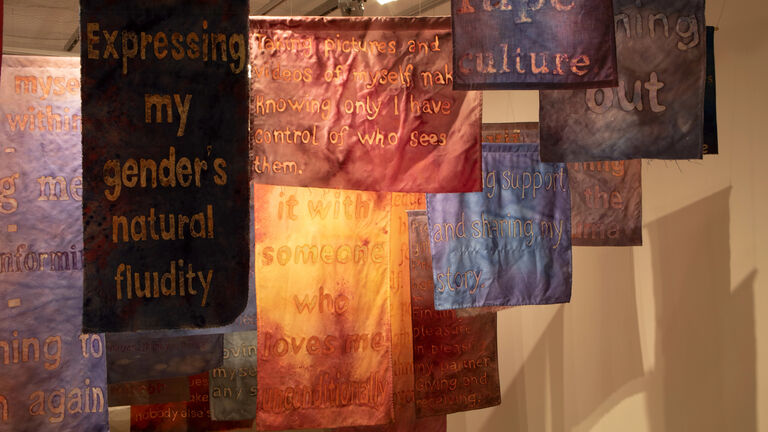
Candice Block, "Pleasure Poetry," 2020
Curriculum & Courses
Curriculum & Courses
-
Art Therapy Core
42
Art Therapy Fieldwork
9
Art Therapy Thesis (option)
6
Art Therapy Graduate Project (option)
3
Studio Electives (or other approved course)
3 or 6
Total Credit Hours
60
-
Term
Credit Hours
First Year Fall
12
- ARTTHER 5001 Materials and Media in Art Therapy (3)
- ARTTHER 5002 Psychopathology (3)
- ARTTHER 5003 History and Theory of Art Therapy (3)
- ARTTHER 5025 Counseling Techniques (3)
First Year Spring
12
- ARTTHER 5008 Assessment and Evaluation in Art Therapy (3)
- ARTTHER 5019 Group Art Therapy (3)
- ARTTHER 6008 Culture Dimensions in Art Therapy (3)
- ARTTHER 5135 Community Practice and Helping Relationship (3)
Second Year Fall
12
- ARTTHER 5020 Art Therapy Fieldwork I (1.5)
- ARTTHER 6002 Ethical and Legal Issues I (1.5)
- ARTTHER 5010 Human Growth and Development (3)
- ARTTHER 6018 Family Art Therapy (3)
- Studio Elective (3)
Second Year Spring
12
- ARTTHER 6001 Art Therapy Fieldwork II (1.5)
- ARTTHER 6002 Ethical and Legal Issues II (1.5)
- ARTTHER 5009 Research in Art Therapy (3)
- ARTTHER 6007 Substance Use (3)
- Studio Elective (3)
Third Year Fall
6
- ARTTHER 6020 Art Therapy Fieldwork III (3)
- ARTTHER 6010 Graduate Thesis I: Art Therapy (3)
OR
ARTTHER 6019 Art Therapy Graduate Project (3)
Third Year Spring
6 (or 9)
- ARTTHER 6020 Art Therapy Fieldwork III (3)
- ARTTHER 6006 Professional Development and Career Counseling (3)
- Optional 3 Credit Course
ARTTHER 6011 Graduate Thesis II: Art Therapy (3)
Total Credit Hours
60 (or 63)
Art Therapy and Counseling Degree Requirements and Specifications Continued
-
Students have a maximum of four years to complete the degree. This includes time off for approved leaves of absence. Thesis in Progress: Students who have not submitted a finished thesis for review and approval by the end of the final semester of enrollment are given a Thesis in Progress grade (IP). All students with a Thesis in Progress grade (IP) will be charged the Thesis in Progress Fee in each subsequent full semester until the thesis is completed and approved and the grade is changed to Credit (CR). If the statute of limitations is reached without an approved thesis, the grade will be changed to No Credit (NCR).
-
A minimum of 48 credit hours must be completed in residence at SAIC. Up to 12 graduate transfer credits (from previous master's degrees) may be requested at the time of application for admission and are subject to approval at that time. No transfer credit will be permitted after a student is admitted.
-
One studio elective may be taken prior to the sixth semester, including during a summer semester or winter interim, by any student wanting to complete the program in five semesters. An elective non-studio course may be substituted for one studio with the prior approval of the department chair.
-
At the end of semesters I and IV, each student participates in a Professional Progress Review (PPR). The PPR is an evaluative process used to determine the student's progress in the program. It includes a self-assessment as well as evaluation by each of the student's faculty members. Satisfactory progress in the program is necessary prior to advancing to the next phase of the MA in Art Therapy and Counseling program. Serious academic or interpersonal deficiencies may result in termination from the program.
-
As part of the Art Therapy Master's program internship requirement, students are obligated to meet the trainee expectations of their internship site. These requirements may include a criminal background check, drug testing, the submission of immunization records, special training, etc.
-
6 credit hours for fall and spring semesters, 6 credit hours in the summer.
Course Listing
Take the Next Step
Visit the graduate admissions website or contact the graduate admissions office at 312.629.6100, 800.232.7242, or gradmiss@saic.edu.